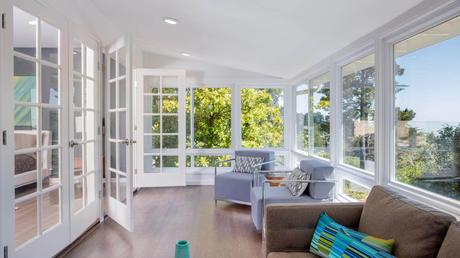
Last Updated on October 2, 2023 by Kravelv
As the season transitions into summer, it could be beneficial to start setting up your sunroom. This will prevent you from sweating excessively or getting sunburnt after a prolonged period of sunbathing. Sunrooms come with an array of advantages. They offer a space to connect with your family, enjoy peaceful alone time, or delight in listening to your favorite audiobook. All this while your skin receives a gentle tan without being subjected to harsh, direct sunlight. If the sunroom concept is new to you or if you've never had the opportunity to design one before, don't worry. These five insightful and fantastic tips will assist you in getting started.
Identify the Main Function of Your Sunroom
Designing a sunroom you'll love and use often begins by identifying its main function. This could be anything from a casual family gathering space, a seasonal dining area, a home office, a music and recreation room, to a library.
The key to a successful design lies in understanding its primary purpose. This will guide how you furnish and outfit the space. For instance, if the sunroom is meant to be your workspace, ensure it's properly wired for strong WiFi connectivity. Consider incorporating speakers and a flat-screen TV if it's intended for music or recreation. For a family room or library, custom built-in bookcases would add a touch of elegance and practicality.
Determine Size and Location
The room's location involves more than merely its logical connection to the house. The attachment point of the sunroom dictates its orientation and the amount of sunlight it will receive. You might also have a specific vantage point of your yard that you would like to optimize.
Upon deciding where the sunroom will be attached, determining its size becomes simpler. Understanding the dimensions is crucial as it not only defines the size of the room you're constructing but also aids in identifying its purpose.
Complement Your Home's Architectural Design
A fundamental principle when constructing a sunroom is to ensure it matches the architectural style of your home. A mismatched addition can result in a permanent eyesore. For instance, if your home boasts a vintage architectural style, it would be inappropriate to attach an ultra-modern sunroom.
Understanding the architectural style of your home not only ensures aesthetic harmony but also functionality. If the sunroom's design doesn't align with the rest of the home, it may be a room with no practical use.
Search for a Reliable Supplier
Opt for a contractor who is locally or regionally based, as they will have a better understanding of the materials and structures that suit your specific climate. Verify their experience in handling the project similar to yours.
For sunrooms, it's imperative to have high-quality windows, and the contractor must have expertise in window replacement. Always insist on getting a bid from your contractor before they start working on the sunroom. Lastly, don't forget to request and verify references.
Acquire the Required Permits
Compliance with building regulations is a must for constructing sunrooms, and securing the necessary permits before initiating the construction process is essential. The type of permits required might differ across states and even between counties within the same state.
Typically, both a construction permit and an electrical permit are needed. The specifics of which permits are mandatory and the process for obtaining them should be discussed with the selected contractor and suppliers.
Endnote
Be thorough and patient when constructing a sunroom, ensuring you've extensively researched all the preceding steps. In your locality, investigate the options for window replacement, roofing choices, and contractors with a background in sunroom builds.
